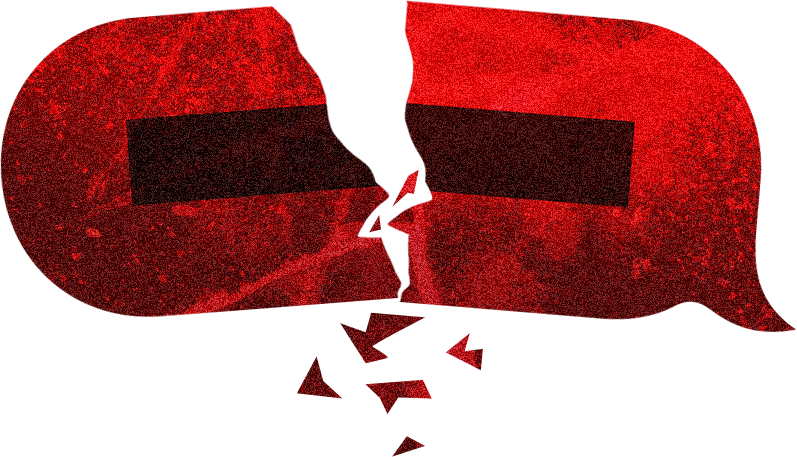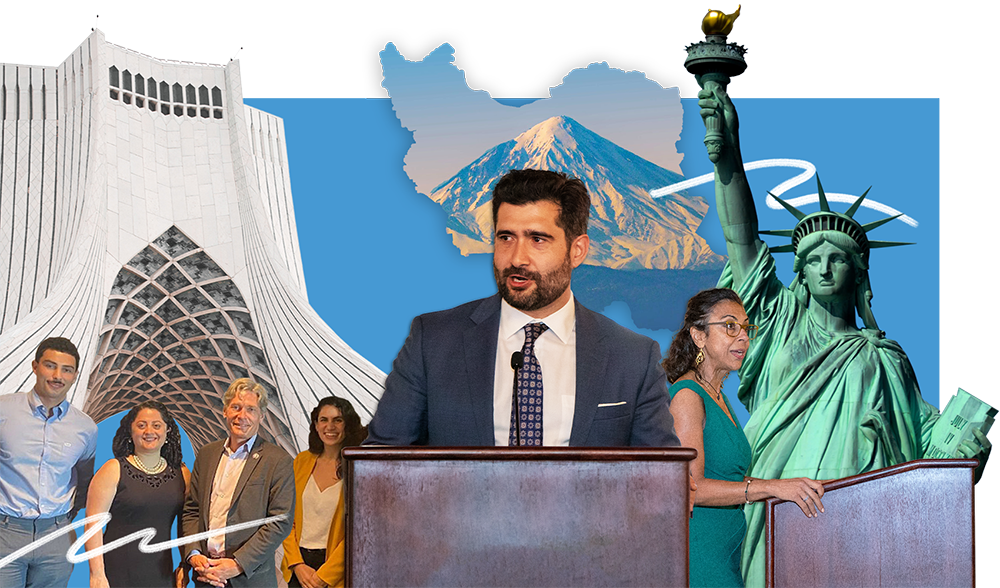
Disinformation harms democracy and the struggle for freedom.
NIAC is being targeted with a disinformation campaign intended to silence our work for peace, diplomacy, and Iranian-American civil and human rights.
The extensive disinformation and slander targeting our organization is not new, though in recent months it has escalated and includes violent threats toward members of our community, especially Iranian-American women.
dis·in·for·ma·tion
Disinformation and threats have also been aimed at journalists and others that write or speak publicly about the struggles for freedom in Iran.
There will always be a range of perspectives among the Iranian-American community, but there should be no place for slander, disinformation, intimidation and harassment in our discourse. Our belief in a healthy democracy means that we respect the right for differing views and encourage insightful debate. It is through such thoughtful exchanges that we can learn and grow as a society.
“…there should be no place for slander, disinformation, intimidation and harassment in our discourse.“
Disinformation has a corrosive effect on our political debate and leads to disastrous outcomes. Just look at the Iraq war 20 years ago, when those who took a principled opposition to war and questioned the administration’s warmongering were subject to vicious attacks questioning their loyalty and bravery. Removing their voice from the political playing field was a key part of selling war – just as our opponents are hoping to silence us and clear the path to military escalation.
Disinformation has also undermined our democracy by convincing a large portion of Republican voters that the 2020 election was stolen, when Donald Trump was clearly rejected by voters. Conspiracy theorizing on the deadly COVID-19 pandemic and safe and effective vaccines has also undermined public health, both here and in Iran.
Disinformation, likewise, has had a corrosive effect on the Iranian-American community, convincing some to support the Muslim ban and question established fact like the 1953 US-sponsored coup of Mohammad Mossadeq; silencing academics, journalists and activists who are engaged in important work aimed at contributing to public knowledge; and even crafting bizarre conspiracy theories about a bomb threat that was called in to the University of Chicago to cancel a speaking event.
These are just a few examples of the ways that this disinformation campaign is distorting public discourse and suppressing support for Iranians that are standing up to a brutal regime. Other harms include:
- Placing individuals that are targeted at risk of physical harm and subjecting them to cyber harassment and verbal abuse;
- Creating a culture of intolerance within the diaspora, which prevents an open exchange of opinions and ideas; and
- Making leaders increasingly reticent to publicly speak out against the brutal repression of the people of Iran.
These attacks sow harmful division and intolerance within the Iranian American diaspora. There will always be a range of opinions about how to fight for the human rights of all Iranians. However, disagreements must be rooted in fact. Disinformation is a tool of oppression and is a major distraction when our focus should be on supporting the Iranian people.

What false information is being spread?
NIAC is a community-led and community-funded organization that is completely independent of any and all governments. We are fully transparent about our funding and activities.
This slander is intended to delegitimize peaceful strategies embraced by NIAC, including principled opposition to war and support for ending broad sanctions that hurt ordinary Iranians.
NIAC stands in solidarity with the people of Iran who have an unquestionable right to speak out against the injustices and repression they face. NIAC supports the self-determination of the Iranian people, which means the autonomy and agency for Iranians to decide their own future. Visit the NIAC Solidarity Center to learn more.
NIAC supports political change led by the Iranian people inside Iran and the fundamental right of the Iranian people to decide their own future.
Self-determination is a central principle of democracy that is core to NIAC’s values, and the current movement in Iran shows mass discontent with a system that has refused to meet the demands of Iranian civil society. NIAC’s support for diplomacy has always been rooted in our principles of preventing war and ending broad sanctions, which we believe are essential for the Iranian people to be able to exercise their right to self-determination and to best enable organic change led by Iranians inside Iran.
It is the inalienable right of the Iranian people to decide their government, and NIAC has and will continue to always support them.
NIAC has always unequivocally supported the Iranian people and their right to protest, to dignity and freedom, and to determine their own future. From the outset of the Women, Life, Freedom movement, our work focused on condemning the brutality of the Iranian government, lifting up the voices of the people of Iran, and advocating for practical policy solutions to support the Iranian people.
This was also the case in past rounds of protest, including in November 2019 when NIAC strongly condemned the brutal crackdown and internet blackout, formally petitioned the Trump administration to take steps in support of internet freedom (eventually enacted by the Biden administration in September 2022), supported a resolution that passed the House of Representatives condemning the crackdown and intensified our work to spotlight the human rights situation.
NIAC stands in solidarity with the people of Iran who have an unquestionable right to speak out against the injustices and repression they face. NIAC supports the self-determination of the Iranian people, which means the autonomy and agency for Iranians to decide their own future. Visit the NIAC Solidarity Center to learn more.
This is completely untrue. Diplomacy in the interest of human rights is a proven and effective method of supporting ordinary people and has been used throughout history to challenge brutal regimes. NIAC believes diplomacy is a far more effective tool to enable the Iranian people to pursue organic change from within, and that war and broad sanctions harm civil society and ordinary people who seek change, and enable authoritarians to consolidate their power
There should always be room for differing opinions on the type and timing of diplomacy, and NIAC has called for and supported breaks in negotiations during the Green Movement and the Women, Life, Freedom protests. However, to accuse anyone that employs diplomacy in any situation of being complicit is a hollow and disingenuous argument. In fact, many of those who make this accusation against NIAC have themselves embraced diplomacy when it suited them.
What’s really happening is that people and groups with a political agenda are using illegitimate attacks on NIAC to elevate themselves and attempt to win policy debates through disinformation rather than on the merits of their case.
There is a constellation of voices and entities behind the disinformation campaign. While they may not share similar goals, they mutually benefit from the smear tactics:
- State actors using bots and other deceptive tactics to create faux legitimacy to advance their own interests
- Some leaders supporting U.S. military intervention in Iran and Iran’s permanent division and isolation that seek to silence voices calling for other means to support the uprising in Iran
NIAC is a powerful voice in support of Iranian Americans and human rights in Iran – that is why those with a different agenda choose to spread falsehoods rather than engage in a healthy and truth-rooted debate.
- Outside of the Iranian American diaspora, state actors target and oppose NIAC because NIAC is a powerful anti-war voice and an advocate for ordinary people. These actors include both Iranian state-sponsored media, Israeli and Saudi-backed media, and groups including the MEK.
- Some share NIAC’s goals of human rights and democracy but oppose the approach we take towards achieving our goals. NIAC does not believe in American military intervention in Iran. We do believe in supporting Iranians leading demands for justice and democracy, which guides everything we do.
- Some are opposed to Iranian Americans building political power in our country and, by undermining NIAC with falsehoods, seek to advance their own political agenda.
- In response to vicious, organized and persistent campaigns, some have been manipulated into believing falsehoods about NIAC, our actions, our values, and our goals.
NIAC believes that only the Iranian people can secure sustainable democracy in Iran and our support for diplomacy, and opposition to war and broad sanctions, is how we can best support them. Some opponents of NIAC’s work have legitimate disagreements with us around this stance and other policy issues but have engaged in illegitimate attacks on NIAC to win policy debates through disinformation rather than on the merits of their case. These groups include many in the pro-intervention political sphere, others in the far right pro-Israel crowd, and some among Iranian dissident groups in the diaspora.
The campaign tactic of smear and intimidation is often aimed at anyone that does not align with a particular political agenda.
At this point, there are few prominent Iranian Americans who haven’t at some point been accused of being a lobbyist for the regime, underscoring the absurdity of the accusation. Journalists, such as CNN’s Christiane Amanpour, The New York Times’ Farnaz Fassihi and The Washington Post’s Jason Rezaian have been similarly targeted with false and outrageous accusations of complicity with the regime, which are ridiculous by their very nature and patently false. Other leading public figures, like Reza Aslan and Maz Jobrani, have likewise been targeted with a cancellation campaign and intense public pressure even though they are among the best representatives of the community in their chosen fields of endeavor. The conspiracy theorizing and disinformation has even targeted a charity set up to support children stricken with cancer. Do the purveyors of these lies have no shame?
These lies and accusations have become so common in our community’s political discourse that they are even hurled at figures on the opposite side of the political spectrum from NIAC who support broad sanctions and oppose any diplomacy. The neo-fascist group Farashgard recently complained publicly that even their mild-mannered critiques of other opposition figures triggered the label of “agents of the Islamic Republic,” and warned against “years of trying to silence the voices of nationalists and monarchists and not adhering to freedom of speech and labeling critics as ‘divisive’ and ‘agents of the regime.’” Here, they decry the same divisive and destructive tactic that have been employed with abandon against NIAC and so many others within the community. Only by rejecting ALL of these ridiculous smears, regardless of their target, can our community rise above this petty bickering and begin to advance true solutions that center the well-being of the people of Iran.
Some attacks against NIAC are rooted in campaigns against the very concept of diplomacy and negotiation.
NIAC supports diplomacy and negotiation, which are proven approaches to dealing with adversaries and achieving meaningful change.
Some of our fiercest critics are opposed to utilizing diplomacy and negotiation and believe only in foreign intervention in Iran as a means to political change.
- NIAC does not believe in American military intervention for any geopolitical aim.
- NIAC does believe in supporting Iranians leading demands for justice and transition. Lasting and just change can only be led from within. Successful and sustainable change of governance can only succeed if it is led by, reflects and achieves the goals of Iranians.
Rather than debate the merits of military intervention, some of our opponents – which include state actors – distract the conversation by waging smear campaigns against anti-war voices.
The Iran Disinformation Project was previously funded by the Trump administration’s Global Engagement Center at the U.S. State Department. However, after an exposé revealed that this organization was also using its platform to attack journalists, human rights activists and civil society organizations like NIAC – contrary to U.S. law prohibiting government propaganda against U.S. persons – the Trump administration was forced to sever its funding. In one case the Iran Disinformation Project attacked a researcher for Human Rights Watch because they had looked into the human rights impact of sanctions on ordinary Iranians. Sanctions can hurt ordinary Iranians, and sanction reform is a legitimate, peaceful strategy that NIAC embraces to improve the lives of Iranians. The Iran Disinformation Project also specifically targeted supporters of the 2015 nuclear deal with Iran, including NIAC, to further try and delegitimize diplomacy. Slander and false accusations like this are intended to delegitimize the peaceful strategies embraced by many experts, policymakers, and activists and create the untrue impression that there is only one viable path forward – intervention.
While Iran Disinfo Project lost its U.S. government funding, the attacks and platform manipulation efforts it was a part of have continued and significantly amplified amid the Women, Life, Freedom movement in Iran.
Emily Schrader is the founder of a consulting firm that counts the Israeli government among its clients. She has repeatedly attacked NIAC amid the movement for freedom in Iran, leveling false accusations that we oppose internal regime change and are a lobby for the Islamic Republic. Her evidence for these false claims is that NIAC supports diplomatic approaches to improving the lives of Iranians and better enabling them to make such a change, such as through sanctions relief. Diplomacy in the interest of human rights is a proven and effective method of supporting Iranians and has been used throughout history to counter threats from brutal regimes. NIAC believes that peace with our country of heritage will best position Iranians to secure meaningful change. We advocate for diplomacy rather than war and lifting sanctions that harm our families. Emily Schrader’s claims to the contrary are merely an attempt to undermine any voices that support diplomacy in favor of her own interests.
NIAC seeks to ensure that ordinary Iranians benefit from sanctions relief while recognizing the many challenges of corruption and authoritarianism that will seek to undermine such relief if it is granted. However, these challenges must be confronted and are not an excuse to simply continue broad sanctions that punish people instead of the government and entrench and enrich Iran’s authoritarians. Sanctions make the rich and corrupt richer and more corrupt, and they impoverish and isolate the people in a way that makes it harder for them to stand up to their government and secure sustainable change.
NIAC is a powerful voice in support of Iranian Americans and our collective interest in democracy, human rights and peace. That is why those with a different agenda resort to harmful tactics like threats, personal attacks, and falsehoods rather than engage in a healthy and truth-rooted debate.
NIAC is not the only U.S.-based entity under attack with the same false accusations – journalists, academics, elected officials and other leaders have also been smeared with the same outrageous accusations of complicity with the human rights abuses of the Iranian government.
One outcome of these false attacks is to disrupt healthy and honest exchange of ideas within the Iranian diaspora.
Rather than allow an exchange of information and perspectives, NIAC’s opponents are attempting to have one voice, one agenda and one perspective in the diaspora. This is the opposite of movement building – using falsehoods, intimidation tactics and doxxing only weakens the power of the diaspora and causes real world harm.
Threats intended to sow division within the diaspora harms all Iranian Americans and the collective effort to the Iranian people. Iranian Americans will always have a diversity of ideas and beliefs – that is part of our collective strength. However, using the tools of oppression – including disinformation and threats – damages all of our efforts.
There is a constellation of voices and entities behind these threats. While they may not all share the same goals, they mutually benefit from this harmful tactic:
- State actors using media and social media manipulation through bots and other deceptive tactics to create faux legitimacy
- Some leaders supporting U.S. intervention in Iran who seek to silence voices calling for other means to support the Iranian people
- Some opponents of diplomacy
Examples of threats against NIAC and individuals perceived to be associated with NIAC
In October, 2022 the university of Chicago Institute of Politics received a bomb threat against a panel discussion following a threatening video falsely alleging that a featured panelist was somehow connected to the Iranian government and part of NIAC, and that NIAC and the Democratic Party are part of a cabal led by the Islamic Republic. After the bomb threat was reported, social media accounts opposed to NIAC began promoting a false narrative that NIAC was behind the bomb threat before pivoting to a new claim that actually there had been no bomb threat.
Since then, numerous public events have been canceled and Iranian-American academics have been deplatformed in response to mass email campaigns filled with false accusations backed by no credible evidence. Rather than acknowledge that there is a disagreement about ideas, these campaigns resort to ad hominem attacks. Threats and lies aimed at preventing the free exchange of ideas only benefits those who want to control and manipulate Iranian Americans with disinformation, and is extremely harmful to democracy, to Iranian Americans, and to Iranians’ own fight for self-determination.
In November 2022 Middle East Eye published a story about Iranian American journalists who have received threats and been harassed because of their reporting on Iran. The article focused on Farnaz Fassihi, a reporter at the New York Times, who has been subjected to widespread abuse online for alleged “apologism” for the Islamic Republic in her reporting. Additionally, the article mentions that many other journalists and activists and virtually anyone working for or associated with NIAC has become a target of similar harassment.
These threats and harassment prevent reporters from doing their jobs and limit access to objective reporting on Iran. Additionally, this limits the free exchange of ideas and discourse about strategy within the diaspora, as it gives individuals the impression that if they speak up with new or differing opinions, they may become targets for harassment.
In January 2023, the Seattle City Council introduced Resolution 32078, a resolution sponsored by councilmembers Dan Strauss and Debora Juarez that affirms the City of Seattle’s support for Iranian people engaged in peaceful protest for their fundamental human rights and calls on Governor Inslee, President Biden and Seattle-based business to take actions to support the Iranian people. However a vote on the bill was repeatedly stalled by continued attempts by some activists to include in the bill baseless accusations against NIAC including a demand that the City Council call for an FBI investigation into the organization.
Efforts like this are the byproduct of a coordinated disinformation campaign against NIAC, and prevent Iranians from receiving the support they need. The Seattle City Council expressed frustration at the continued attempts to include vindictive and anti-democratic language in the resolution and it was ultimately scuttled.These actions prevent activism and support from going to Iranians in need, and is part of the playbook those with a different agenda resort to rather than engage in a healthy and truth-rooted debate.
Thankfully, the Seattle City Council did eventually pass a resolution with the support of NIAC standing with the people of Iran and celebrating Norooz, the Persian New Year.
In 2020, certain activists convinced three prominent pro-war hawks in the U.S. Senate to send a letter to the Trump Justice Department urging that they investigate NIAC because, they claimed falsely, our advocacy and views supposedly align with the Islamic Republic and thus we may be foreign agents. They did not level these accusations of dual loyalty against any of the numerous organizations, experts, and policymakers who share NIAC’s views but do not have Iranian heritage.
Dozens of national organizations and leaders — including MoveOn, Indivisible and then-Washington Lieutenant Gov. Cyrus Habib — rallied to NIAC’s defense in the face of this outrageous smear.
Sens. Tom Cotton, Ted Cruz, and Mike Braun’s flimsy effort with the Trump Justice Department went nowhere. A similar letter had also been sent in 2010 by another hawkish Senator, John Kyl, and similarly achieved nothing but some publicity for groups including the MEK to smear NIAC and anti-war voices.
Accusations of dual loyalty are a dangerous trope often waged against immigrant communities to intimidate them from being able to fully participate in our democracy. While some opposition activists with the Iranian-American community may promote these attacks in the hopes that they will remove anti-war and independent voices from the debate, these claims undermine all Iranian Americans regardless of political views. They feed into xenophobic and nativist stereotypes against our community, help promote discrimination and assaults on all of our civil rights, and provide ammunition to delegitimize and remove Iranian-American voices from the democratic process.
The need for a healthy exchange of ideas and information
A healthy exchange of ideas and information within the Iranian American diaspora is crucial for fostering an inclusive and cohesive community, and supporting Iranian Americans and Iranians’ fight for self-determination. By sharing diverse perspectives and experiences, members of the community can learn from one another, build mutual respect and foster a sense of unity. Open and honest discussions can help to address complex issues and promote understanding of cultural and social differences. This exchange can also contribute to the advancement of the community by generating innovative ideas and solutions to shared challenges.
NIAC envisions a world where the decisions that impact our community are made by our community. NIAC is dedicated to building political power for the Iranian-American community to advance peace and diplomacy, secure equitable immigration policies and protect the civil rights of all Americans.
Call to help fight these tactics.
Stopping the spread of disinformation will help the Iranian-American community grow our strength and power. Join us in being a voice in favor of respectful dialogue and debate by:
Speak up.
Stand against disinformation and threats – we can disagree about tactics and still be aligned on common goals of peace and democracy.

Reject an "only option."
See past the litmus test that the only legitimate way forward is U.S. military intervention, and embrace the possibility of diplomacy.



